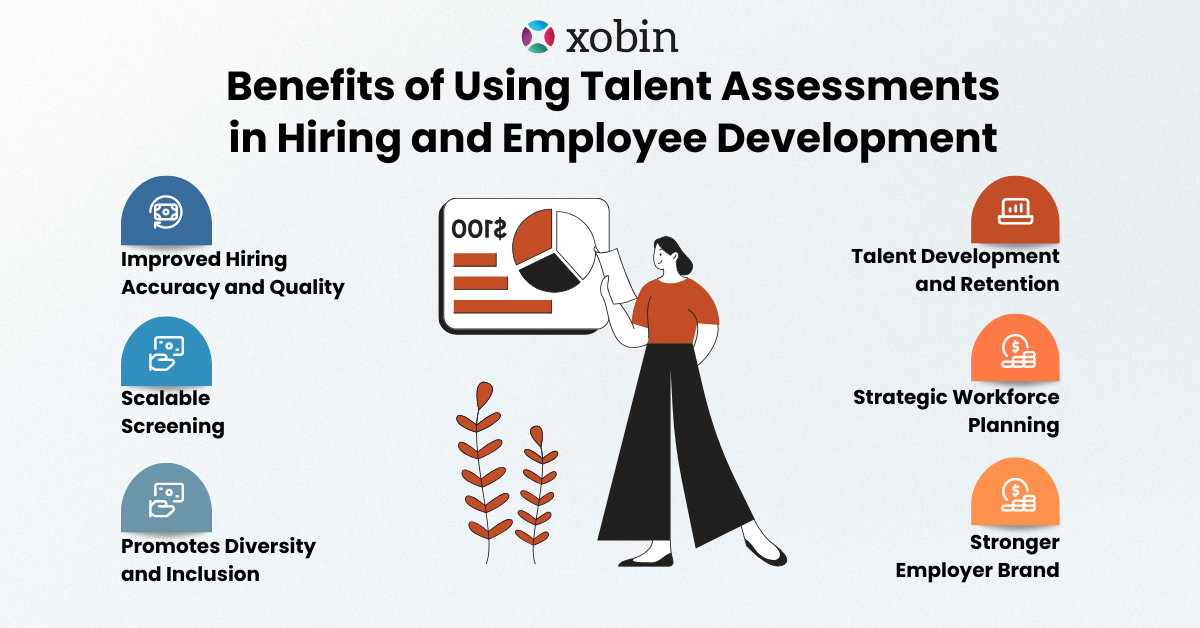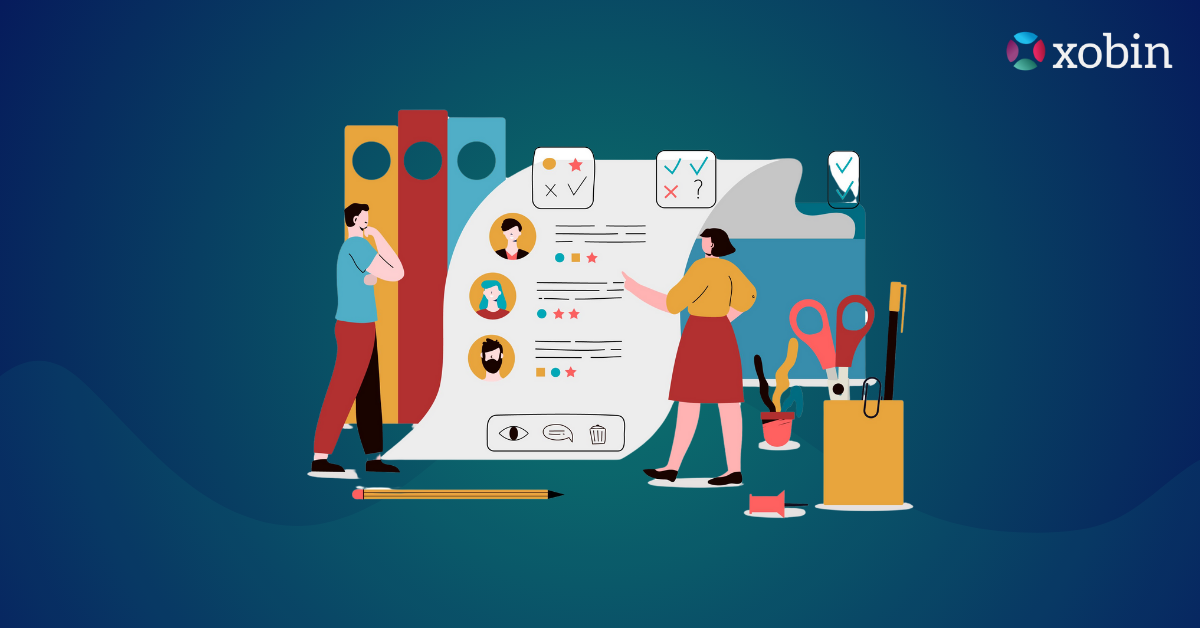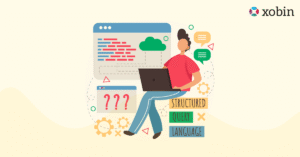Hiring the right people and nurturing them into high performers is one of the most critical challenges in this skills-driven market. With shrinking talent pools, rising cost-to-hire, and increasing pressure to future-proof the workforce, traditional methods of talent assessment for recruitment and employee development no longer cut it.
Table of Contents
- How can you be sure you’re hiring the best-fit candidates?
- Are your current employees in the right roles to drive business outcomes?
- Are gut feelings and resumes still reliable in the age of data-driven decision-making?
This is where a powerful, strategic approach to talent assessment becomes a game-changer. Deloitte found that companies using data-driven candidate evaluation tools are four times more likely to improve the quality of their hires.
In this comprehensive guide, you’ll discover everything you need to know about talent skill evaluation. Whether you’re hiring, promoting, or planning succession, this guide has answers to help you identify, evaluate, and elevate top talent with confidence.
What is a Talent Assessment?
Talent assessment is a deliberate and evidence-based process organizations use to gauge a candidate’s skills, potential, personality, and fit. It’s much more than watching resumes or interviewing; it’s a scientific approach combining data, psychology, and analytics to predict performance. This process can include anything from talent skills assessment through job trials & simulations to personality profiling and cognitive tests.
For C-suite leaders, the appeal lies in its precision and scalability. Today, online assessments deliver objective insights quickly, reducing bias and improving the candidate experience. Over time, this empowers smarter decisions not just for hiring, but also for internal recruitment, upskilling, and leadership development.
Moreover, talent assessment empowers companies to match the right individuals with the right roles, ensuring long-term productivity, engagement, and employee retention.
Did You Know?
According to the Harvard Business Review, 80% of employee turnover is due to bad hiring decisions. And yet, many companies still rely on outdated methods like gut instinct and generic resumes. With the right talent assessment, you can dramatically increase hiring accuracy and uncover potential your competitors are missing.
Benefits of Using Talent Assessments in Hiring and Employee Development
Implementing robust talent assessment tool yields significant advantages, especially for senior executives who are accountable for organizational growth and culture.

1. Improved Hiring Accuracy and Quality
By incorporating validated structured interviews and language tests, hiring managers move beyond subjective impressions to objective measures of a candidate’s true capabilities. This precision reduces costly mis-hires and accelerates the identification of high-potential candidates.
2. Scalable Screening
In high-volume hiring (campus drives, global expansions), automating screening with test score filtering enables recruiters to quickly eliminate unqualified applicants. This efficiency slashes time-to-hire and reduces dependency on manual interviews, ultimately lowering cost-to-hire.
3. Promotes Diversity and Inclusion
Structured and standardized evaluations minimize unconscious bias, promoting fair and equitable hiring. This fosters bias reduction/diversity and helps attract disabled candidates, Gen Z recruitment, and millennial recruitment talent.
4. Talent Development and Retention
Beyond hiring, employee talent assessment identifies skill gaps, power (soft) skills, and leadership potential. These insights support targeted development, improving engagement and increasing retention.
5. Strategic Workforce Planning
Data from assessments support succession planning, performance enhancement, and talent pool management, enabling more agile and future-proof organizations.
6. Stronger Employer Brand
Candidates appreciate transparent, fair, skills-based hiring. That can enhance your attractiveness to top talent and position you as a modern, data-driven workplace.
Types of Talent Assessments: A Strategic Breakdown
Understanding the different types of talent assessments is essential to designing a comprehensive evaluation process tailored to organizational needs.
| Assessment Type | What It Measures | Ideal Use Case | Xobin Advantage |
| Skills Assessment | Job-specific hard skills (e.g., coding, analytics, sales techniques) | skill-based testing for technical, sales, or operational roles | 3400+ ready-to-use customizable talent skill assessment tests |
| Domain-Specific Tests | Industry or function-specific knowledge | Ensures candidates meet specialized role requirements | 2500+ ready-to-use customizable job role based talent assessment tests |
| Cognitive Ability Test | Logical reasoning, problem-solving, numerical & verbal aptitude | Fast-paced roles requiring mental agility and critical thinking | AI-powered analytics to assess cognitive fit quickly and accurately |
| Personality Assessment | Work style, behavior, team compatibility | Cultural fit evaluations and team-building decisions | Behavioral profiling based on Big Five, DISC, and custom models |
| Situational Judgment Test (SJT) | Decision-making in real-world workplace scenarios | Leadership hiring, customer service, conflict resolution | Custom SJTs tailored for roles and industries with real-life simulations |
| Emotional Intelligence (EI) | Self-awareness, empathy, relationship management | Leadership development, high-stress or people-centric roles | Data-backed employee talent assessment insights for long-term leadership growth |
| Language & Communication Tests | Verbal fluency, grammar, comprehension, business communication | Client-facing roles, content, marketing, and support teams | AI-driven real-time voice/video evaluation & written assessments |
| Psychometric Tests | Personality traits, integrity, work ethic, motivation | Holistic assessment for high-stakes roles or mass hiring | Scientifically validated and customizable test libraries |
How to Build a Strong Talent Assessment Framework?
Creating a robust talent assessment framework involves aligning assessments with business goals and ensuring the process is fair, efficient, and scalable.
Step 1: Define Clear Job Profiles
Collaborate with hiring managers and team leads to specify essential skills, competencies, and behaviors required for success in each role.
Step 2: Map Role-Specific Requirements
What makes a top performer in this role? Identify critical technical skills, soft skills, and cognitive strengths.
Step 3: Select & Combine Test Formats
Choose a combination of talent skills assessment, cognitive, personality, and job trials & simulations to capture a holistic view of candidates.
Step 3: Partner with a Reliable Assessment Platform
Use a tech-driven platform like Xobin, which offers test customization, secure test integrity, and multilingual assessment languages.
Step 4: Pilot & Validate the Framework
Use existing employee data to validate results and adjust scoring based on actual performance enhancement outcomes.
Step 5: Set Benchmarks & Scorecards
Create clear candidate shortlisting criteria and apply proprietary algorithms to ensure fair evaluations.
Step 6: Train Hiring Teams
Equip recruiters and managers with the skills to interpret assessment data objectively and integrate insights into decision-making.
Step 7: Continuously Review and Improve
Monitor outcomes, candidate feedback, and hiring success metrics to refine assessments, ensuring ongoing alignment with organizational needs.
Real-World Examples of Talent Assessments That Work?
When it comes to making high-stakes hiring and talent development decisions, theory alone isn’t enough, and business leaders want proven results. Xobin’s AI-driven talent assessments have repeatedly demonstrated their power to transform how organizations identify, hire, and nurture top talent. Let’s explore a concrete use case that highlights this impact in action.
1. Reducing Costly Mis-hires with Pre-Hire Evaluations
A mid-sized SaaS company was facing a 40% attrition rate within the first 6 months of hire, primarily due to poor role fit. By implementing Xobin’s talent assessment test, which measured cognitive ability, domain-specific skills, and cultural alignment, they reduced early attrition to just 15%. The result? A more engaged workforce and a hiring ROI improvement of 3x.
2. Scaling Tech Hiring During Rapid Growth
A unicorn startup needed to triple its engineering team in under 6 months. Traditional interviews were proving inefficient. By deploying Xobin’s online talent assessment platform with AI-powered remote proctoring, they screened over 5,000 candidates globally in record time. The skills-focused assessments helped shortlist high-quality candidates, cutting hiring time by 40% without compromising quality.
3. Identifying Future Leaders from Within
A multinational manufacturing company needed a succession pipeline for retiring managers. They rolled out employee talent assessments to evaluate leadership potential, emotional intelligence, and problem-solving skills across mid-level staff. Based on the insights, they launched a targeted leadership development program, resulting in a 28% increase in internal promotions over the next 12 months.
4. Improving Diversity Through Objective Hiring
An enterprise-level services firm sought to boost workforce diversity but struggled with bias in interviews. Using Xobin’s structured and unbiased talent skills assessment, they ensured all candidates were evaluated on merit. Over two hiring cycles, they achieved a 34% increase in diversity hires across technical and non-technical roles without altering quality benchmarks.
5. Optimizing Campus Recruitment
For large-scale campus drives, time and consistency are key. A national FMCG brand used talent evaluation tests to assess thousands of recent grads on communication, aptitude, and job-specific knowledge. With Xobin’s customizable assessments and automated shortlisting, the company reduced campus hiring costs by 50% and improved candidate engagement.
Hire Top Talent and Assess Future Leaders with Xobin!
Xobin’s talent assessment platform empowers businesses to identify, evaluate, and hire top performers with unmatched precision. With AI-powered insights, customizable talent assessment tests, and real-world simulations, Xobin ensures you hire right the first time. Whether you’re scaling fast or nurturing leaders, Xobin simplifies it all.
If you’re ready to elevate your talent strategy, explore how Xobin’s talent assessment platform delivers evidence-based insights, tailored role simulations, and analytics that guide your leadership decisions.
Book a personalized demo today and transform how you identify and build top talent for both hiring and development.
FAQs
1. What is a talent assessment, and why is it important?
A talent assessment is a structured evaluation process used to measure a candidate’s skills, personality, and potential for a specific role. It’s important because it reduces hiring bias, improves job fit, and increases employee performance and retention.
2. How does a talent assessment test help in hiring?
A talent assessment test helps employers objectively evaluate job-related skills and behavior, allowing hiring teams to filter unqualified candidates early and focus on those most likely to succeed.
3. Can talent assessments be used for employee development?
Yes, talent assessments are valuable for employee development. They identify strengths, skill gaps, and leadership potential, enabling personalized growth plans and effective succession planning.
4. What are the key features of a good online talent assessment tool?
A robust online talent assessment tool should offer customizable tests, AI-based proctoring, real-time reports, role-based templates, and integration with ATS systems for seamless hiring and evaluation.
5. How do I choose the right talent assessment platform for my organization?
Look for a solution that aligns with your hiring goals, supports various test types, ensures data security, and offers analytics. Platforms like Xobin provide end-to-end support for smarter, scalable hiring decisions.






